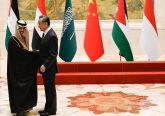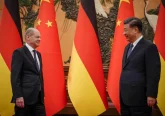Competition is a natural by-product of major powers navigating an anarchic world. Small states face a dilemma, when caught in the middle between two rivaling major powers. Sri Lanka in particular, has captured international attention as a key battleground between Beijing and New Delhi in their tussle for influence in South Asia. Whilst some scholars argue that the island is a personification of China’s ‘debt trap diplomacy,’ others contend that China’s influence should not be exaggerated, as Chinese lending amounts to less than 15% of Sri Lanka’s total external debt.
Concerns over Sri Lanka’s sovereignty have been rife following the US $ 1.12 billion debt-to-equity swap of the Hambantota Port Agreement and the proposed lease of the Mattala International Airport to India. Sri Lanka however, is in no position to break off economic ties with either power. According to Cheng Xueyuan (China’s Ambassador to Sri Lanka), by the end of 2017 Chinese companies had completed infrastructure projects in Sri Lanka worth US$ 15 billion. Consequently, maintaining close diplomatic and economic ties with both Asian powerhouses is imperative for the island.
The geopolitical rivalry between China and India may have lasting ramifications for the island, especially if Sri Lanka were to make a false move. How can small states, such as Sri Lanka, caught in the midst of a major power competition safeguard its security and autonomy, whilst also reaping economic benefits? This article suggests 6 concrete steps that the island – and small states like Sri Lanka in general – should take in order to successfully navigate a major power rivalry.
- It is in Sri Lanka’s best interest to devise a bipartisan foreign-policy white paper. Analysts contend that the National Unity Government of Sri Lanka has been ad-hoc in its decision making, which has led to suboptimal policy choices. A foreign-policy white paper would establish consistency and continuity in Sri Lanka’s foreign policy regardless of the administration which comes to power.
- A defense white paper would outline the broad strategic policy framework for defense planning and sketch the key security priorities for Sri Lanka. It can also be viewed as a confidence – and security – building measure which increases transparency not only in the domestic context but also internationally. This would ensure that Sri Lanka’s foreign policy intentions and actions are not misinterpreted by major powers operating in South Asia.
- A medium-term plan of infrastructure priorities, bipartisan consensus on how to expand exports and a clearly articulated and consistent long term economic strategy are vital for Sri Lanka. As indicated by a former Deputy Governor of the Central Bank of Sri Lanka, the island must “beat the middle income trap through a viable export development policy.” For this purpose, Free Trade Agreements with China and India are advantageous and viable for achieving export-led growth. Yet, negotiations have stalled, owing to public protests.
- Misinformation needs to be more firmly tackled. An effective government communication strategy and greater transparency are essential to disseminate information about the expected benefits from international engagements.
- Sri Lanka stands to benefit from China’s Belt and Road Initiative (BRI). However, when approving or implementing BRI projects, policymakers must verify whether Sri Lanka’s interests are met and ensure that the island’s security, economy, society or ecology are not adversely impacted. A multi-actor approach of pooling resources from universities, nongovernmental agencies and civil society groups could be a way to avoid haphazard and extemporaneous decisions. Such inclusionary assessments, in tandem with project feasibility studies, would allow for more transparent and accountable decision-making.
- Whilst prioritizing economic diplomacy, Sri Lanka must also take steps to make clear that investments and projects in the island’s territory do not function as the exclusive “preserve of one country,” to the detriment of another. Without playing one side against the other or taking sides, Sri Lanka should attempt to diversify its sources of Foreign Direct Investment (FDI).
Critical, transparent and objective reflection prior to decision making is of utmost importance for Sri Lanka. These features have clearly been absent in the past, as the post 2015 National Unity Government tended to be dysfunctional and – at times – erratic in its policymaking. However, setting clear strategic goals is indispensable to institutionalize Sri Lankan policy and make it more predictable. As one analyst remarked: “the next leader needs to invest in institutionalizing the foreign policy of Sri Lanka rather than persisting with the overly personalized foreign policy which exists today and has [been] followed by many others in the past.” In the complex and evolving international environment Sri Lanka confronts, it would serve the island’s interest to remain proactively engaged whilst also adopting a strategically neutral position.
The views expressed in this post belong solely to the author and do not represent the author’s employer or organization.





